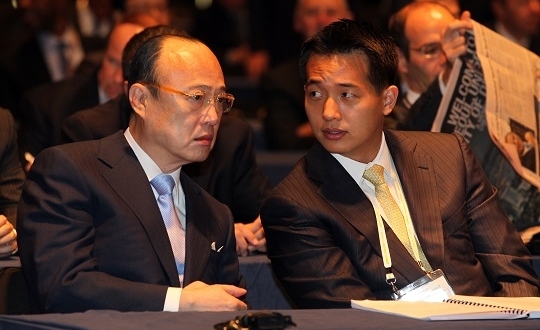Hanwha Group’s defense technology unit was listed Wednesday, suggesting that succession plans are being hastened and Chairman Kim Seung-youn is ready to hand over the reins to his sons.
Hanwha Systems currently has a market cap of nearly 1.3 trillion won ($1.1 billion) and traded slightly below its initial public offering price of 12,250 won at 11,100 won on its first day of trading on the benchmark Kospi.
According to analysts and industry insiders, the company’s Kospi debut will help increase the corporate value of H-Solution, a subsidiary wholly owned by Kim’s three sons. This is due to the fact that H-Solution has become the second-largest shareholder of Hanwha Systems following the listing with a 13.4 percent stake. Hanwha Aerospace, another defense technology unit, remains the largest shareholder of Hanwha Systems with a 49 percent stake.
“H-Solution, solely owned by Kim’s three sons, is likely to merge with Hanwha Corp., the group’s de facto holding firm, in the succession process,” said Kim Haney, an analyst at KTB Investment & Securities.
 |
Hanwha Group Chairman Kim Seung-youn talks to his eldest son Kim Dong-kwan. (Yonhap) |
It is crucial for Kim’s three sons to raise their stake in Hanwha Corp. in order for the succession to be smooth. Hanwha Systems’ stock debut is likely to provide sufficient capital for them to either purchase or exchange stake with Hanwha Corp. via H-Solution. H-Solution’s stake in Hanwha Systems is valued at around 200 billion won.
At the moment, his eldest son and solar power unit Hanwha Q Cells Chief Commercial Officer Kim Dong-kwan holds a 4.44 percent stake in the de facto holding firm, with the second and third, Kim Dong-won and Kim Dong-sun tailing behind with 1.67 percent each.
Though Hanwha Systems’ listing plays a key role in the succession plan, another Hanwha unit’s anticipated IPO next year is projected to hand further clout to H-Solution. Its chemicals unit Hanwha General Chemical, in which H-Solution holds a 39.2 percent stake, is expected to be valued at 5 trillion won following its IPO, adding further momentum to the succession plan.
H-Solution has been slowly increasing its stake in Hanwha Corp. from August last year and now holds a 4.2 percent stake in the holding firm. Its stake stood at 2 percent early this year.
But with a lockup period -– which restricts large shareholders from selling their shares -- scheduled for the next 18 months, Hanwha’s succession plan is likely to be carried out beneath the surface for a while. Meanwhile, the owner family is likely to work on improving its corporate value while preparing for Hanwha General Chemical’s IPO, industry watchers said.
“During the lock-up period H-Solution will maintain its 13.4 stake in Hanwha Systems and use it to generate capital,” Kim at KTB said.
“Hanwha Systems’ information and communications technology business will post an earnings growth with the increased demand for system integration outsourcing tied to Hanwha Group’s overall growth,” he added.
Hanwha Systems posted an operating profit of 44.8 billion won in 2018, which rose 45 percent on-year. It’s net profit jumped 193 percent to 41.2 billion won in the cited period.
When Korean conglomerates pass the baton from one generation to the next, the next generation is almost always required to purchase or inherit stakes in the de facto units of the group. The succession process is usually completed during the previous generations’ lifetime due to the nation’s high inheritance tax that can rise up to 65 percent.
By Jung Min-kyung (
mkjung@heraldcorp.com)








![[Weekender] Korea's traditional sauce culture gains global recognition](http://res.heraldm.com/phpwas/restmb_idxmake.php?idx=644&simg=/content/image/2024/11/21/20241121050153_0.jpg)